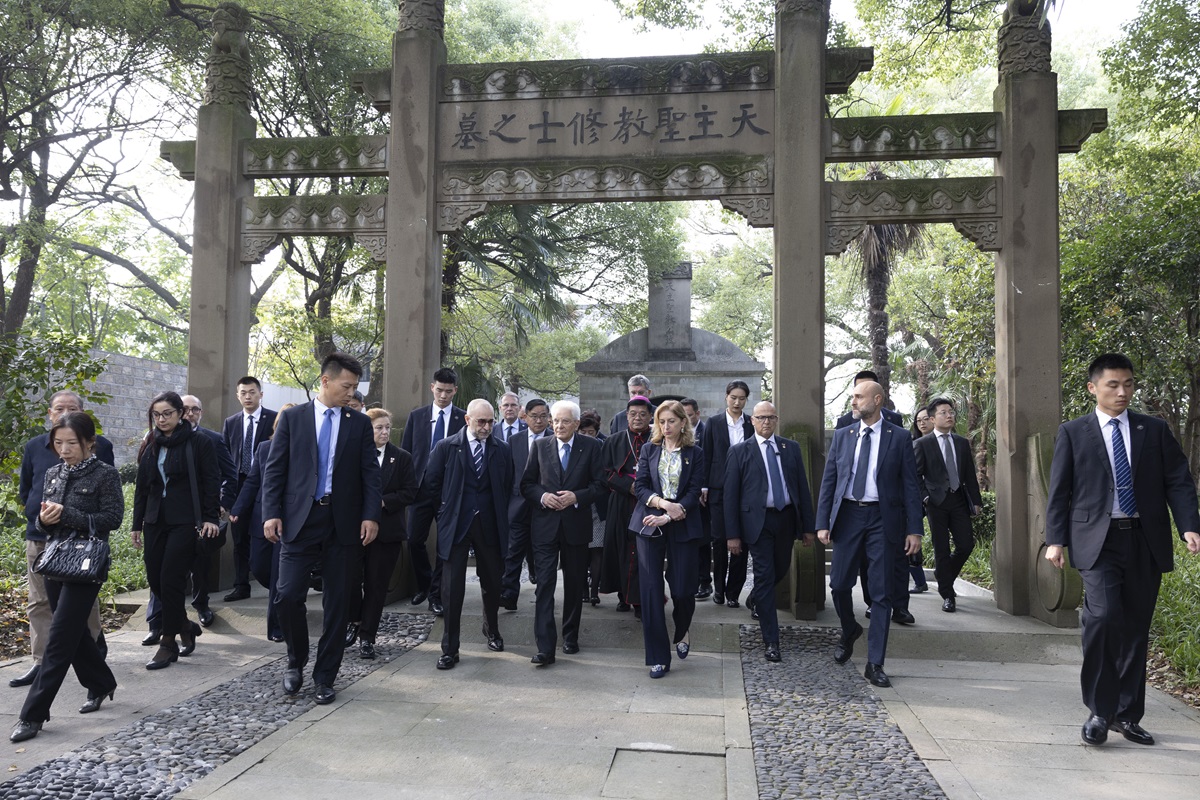Mattarella and missionaries in China
In his speech at Peking University and in his visit to the graves of Intorcetta and Martini in Hangzhou, the Italian leader noted the contribution made by missionaries to dialogue, before and after Marco Polo. Following in their footsteps, the Italian president also spoke in China about human rights.
Milan (AsiaNews) – Deep historical and cultural ties between China and Italy marked the visit of Italian President Sergio Mattarella to China, which is now coming to an end. Missionaries have made fundamental contributions to this relationship.
During the visit, Marco Polo was remembered as one might expect since this year marks the 700th anniversary of his arrival in the Middle Kingdom. However, the Venetian merchant traveller was not the first Italian or European to set foot in China.
Numerous Franciscan missionaries from Italy and other European countries came before, during and after his time, in the 13th and 14th centuries, travelling on the silk roads of Central Asia or crossing the seas of South and East Asia, to reach China.
In his Lectio magistralis last Saturday at Peking University (also known as Beida), President Mattarella mentioned the names of four Italian missionaries, citing them as champions of intercultural dialogue: Matteo Ricci, Michele Ruggieri, Alessandro Valignano, and Prospero Intorcetta.
On Sunday, the president visited the grave of Jesuit missionaries in the beautiful city of Hangzhou, including those of Prospero Intorcetta and Martino Martini.
Sicilian-born Mattarella is well acquainted with Intorcetta, a fellow Sicilian from Piazza Armerina, whom he mentioned seven years ago on his previous visit to Beijing.
In China from 1659 to 1696, he is considered one of the most cultured and undoubtedly the best sinologist among Jesuit missionaries in China.
A convinced follower of the line of 'accommodation' inaugurated by Matteo Ricci (who is decidedly better known and appreciated in China than in Italy), Intorcetta was also involved in the Chinese Rites controversy as his writings indicate.
A major and original authority on the Chinese language, he translated Chinese classics into Latin and published them in Europe. With his work Confucius, Philosopher of the Chinese (Paris 1687, with contribution from the French Jesuit Philippe Couplet), he introduced Confucianism to Europe.
Readers of these works included philosophers like Leibniz, Spinoza, Voltaire, and other scholars linked to Sorbonne University, where events and controversies involving China were followed with great interest. Likely, reading Confucian works translated by the Jesuits and their letters from China somehow inspired the French intellectuals who gave birth to the Enlightenment.
The ideal of an enlightened sovereign, who rules the people with reason and surrounds himself with the best, is also borrowed from the Jesuit description of the Chinese imperial system.
Martino Martini, a missionary from Trento, was in China from 1642 to 1661. He too was involved in the Chinese Rites controversy, authoring the important Novus Atlas Sinensis (Amsterdam, 1655), the first accurate atlas of Chinese cities and provinces available in Europe.
At PIME’s Peoples and Cultures Museum in Milan, we have a very precious copy of the first edition, also available in its entirety in digital form and accessible to the public.
The Jesuit missionaries Intorcetta and Martini have an extraordinary historical merit: they were the first to introduce the geography and philosophy of China to Europe, thus becoming central characters in the Age of Modernity and intercultural dialogue.
Regarding President Mattarella's noteworthy speech at Peking University, I was struck not only by the ideal reference to missionaries, but also to human rights and peace, two of the great contributions of the Christian faith brought by missionaries to China and the world.
The explicit reference to the Universal Declaration of Human Rights is all the more significant since it cannot by any means be taken for granted.
It refers to a theme that is very topical in China and the world. Just as it is not obvious to invoke the goodness of peace, Mattarella reminded China of its responsibility in mediation and peacemaking in the world, in particular with respect to Russia, whose invasion of Ukraine the president explicitly condemned.
The visit to China took place in the name of friendship and dialogue. It is a very positive thing that Mattarella and Chinese President Xi Jinping address each other with respect and sympathy. But this did not prevent the Italian leader from encouraging – in a clear language – his Chinese hosts to follow the path of human rights and peace.
01/04/2019 10:28







.png)










